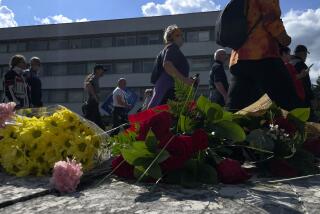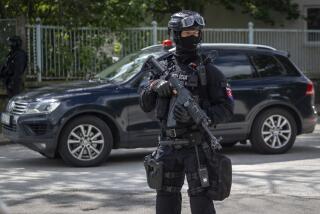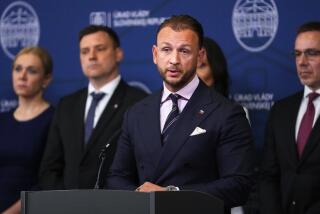Serb Police Find Body of Slain Ex-President
- Share via
BELGRADE, Serbia and Montenegro — The mystery of former Serbian President Ivan Stambolic’s disappearance was solved Friday by police who found his remains on the mountainside where he was slain more than 2 1/2 years ago.
The discovery in a shallow grave was made by investigators looking into a more recent political assassination, that of Serbian Prime Minister Zoran Djindjic, who was killed this month.
Four suspects in custody in connection with the Djindjic assassination were suspected of abducting and killing Stambolic. One of them reportedly led authorities to the lonely spot north of Belgrade where Stambolic’s remains were found.
The former president had been shot twice, execution-style. Police believe Serbian paramilitaries kidnapped him while he was out for a jog in August 2000.
Police believe the killers acted on the orders of Stambolic’s onetime protege and friend, Slobodan Milosevic, who forced him out of office in 1987 and replaced him. The government said Friday that it wanted to question Milosevic’s wife, Mirjana “Mira” Markovic, in connection with Stambolic’s slaying but as of Friday evening they had not found her.
Her husband is in The Hague, where he is on trial before an international tribunal on charges of war crimes during the Balkan wars of the 1990s.
“Belgrade police have solved the greatest mystery of the [Milosevic] regime,” Interior Minister Dusan Mihajlovic told reporters.
The four suspects in the Stambolic case are former members of Milosevic’s feared special police unit, the Red Berets, a group believed responsible for brutalizing non-Serbs during the old Yugoslav federation’s wars.
Stambolic, 63, disappeared Aug. 25, 2000, less than a month before Yugoslavia, which then consisted of only Serbia and Montenegro, was due to hold presidential elections.
The former leader had indicated that he was willing to run against Milosevic, a move that observers say unsettled the Serbian strongman and his wife.
“The investigation has established that the motive was political, to eliminate Mr. Stambolic as the candidate at the coming presidential election, and that clearly points to who might have issued the orders for this crime,” Mihajlovic said. “This is why we are going to interrogate both Slobodan Milosevic in The Hague and Mira Markovic.”
Despite the removal of Stambolic, Milosevic was toppled by a popular revolt in October 2000. His once-loyal paramilitary force abandoned him and then let Djindjic hand him over to the U.N. war crimes tribunal.
Some of those paramilitaries also were deeply involved in organized crime. When Djindjic attempted to crack down on them, they decided to assassinate him as well, the government alleges.
Police blame a powerful gang called the Zemun clan for masterminding the March 12 ambush outside of government headquarters that killed Djindjic. Hundreds of people have been arrested in connection with his slaying.
It was reported that one of the suspects in the Stambolic slaying led investigators to the spot on a mountain known as Fruska Gora, about 30 miles north of Belgrade, where the former president was allegedly executed. His body was buried in a pit dug in advance, Mihajlovic said.
Stambolic rose to prominence in the 1980s, in a career that served as the template for Milosevic’s rise. The two had met as law school classmates in Belgrade, and Milosevic was inspired to go into politics partly by Stambolic’s example.
The scion of a family of powerful Communist officials, Stambolic became president of Serbia, one of Yugoslavia’s republics. In 1986 he installed Milosevic as Communist Party chief.
But a year later, Milosevic turned on his mentor and had him ousted. Stambolic kept a low profile for the next decade while becoming increasingly critical of Milosevic’s rule.
News that Stambolic’s remains had been found was greeted with relief and anger by his son, Veljko.
“This is a relief for the family,” he told B-92 radio in Belgrade. “It also brings closure to one of the dark acts of the previous regime that ruined all of us.”
He complained that Serbian paramilitaries such as those who allegedly killed his father had been allowed to operate unchecked for too long, wreaking havoc on state and society.
“The beasts were not caged in time,” Veljko Stambolic said.
*
Times staff writer Chu reported from Berlin and special correspondent Cirjakovic from Belgrade.
More to Read
Sign up for Essential California
The most important California stories and recommendations in your inbox every morning.
You may occasionally receive promotional content from the Los Angeles Times.














